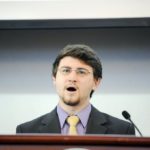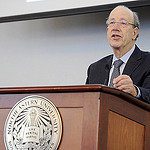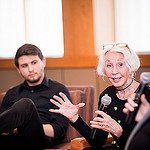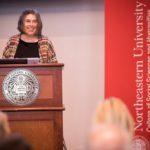Since the 1970s, Northeastern has hosted an annual week-long series of events dedicated to remembering the Holocaust and to exploring issues arising out of the war of extermination against the Jews and other groups targeted by the Nazis. This year’s Holocaust Awareness Week events focused on the Holocaust’s legacy in the 21st century through the theme of “The Impact of the Holocaust on the Next Generation.”
The university’s Holocaust awareness events, which are presented annually by the Humanities Center and the College of Social Sciences and Humanities in partnership with the Holocaust Awareness Committee, usually take place during one week in the spring semester. This year, two events took place as originally scheduled in January, to coincide with International Holocaust Remembrance Day and the 70th anniversary of the liberation of Auschwitz, while two others were moved to April due to inclement weather. Northeastern law school’s commemoration occurred as usual in conjunction with Yom Ha’Shoah, which this year came in April.
The events opened on January 29 with Northeastern’s annual Holocaust Commemoration. In his welcome remarks, President Joseph E. Aoun made clear that places of safety were still necessary. Aoun stressed the importance of fostering productive dialogues on issues of anti-Semitism, racism and other forms of hatred throughout the year and of establishing that intolerance of any kind is unacceptable.

The Commemoration featured a moving performance by Elijah Botkin, S ’15, a mathematics and music major and this year’s Gideon Klein Scholar, as well as a keynote address by Phil Brown, University Distinguished Professor of Sociology and Health Sciences. The Gideon Klein Award honors the memory of Gideon Klein, a pianist and composer who was imprisoned in concentration camps until his death in 1945.
For his Gideon Klein research project, Botkin set to music a translation of a poem—“The Closed Town”—written by a child at Terezin, a fortress that held more than 140,000 people during World War II before they were transported by train to Auschwitz and other death camps. The musical piece, which featured chorus, string quartet, and chimes, took Botkin six months to write. Botkin sang the piece at the commemoration and conducted it during the NU Choral Society’s spring concert on April 18. Botkin is president and bass section leader of the society, and sings with the Zamir Chorale of Boston.

Brown’s keynote address focused on the Catskills during the Holocaust and in the years after. Brown grew up in the Catskills, which at the time was a vibrant Jewish resort central to American Jewish culture. Watching that culture disappear propelled Brown to be its chronicler as president of the Catskills Institute, an organization that records the region’s history, and the author of five short stories. Brown explained that Holocaust survivors flocked to the Catskills in the 1940s. “The Jews in the Catskills created their own sort of promised land, a place of safety,” he said.
The film, Four Seasons Lodge, which was shown on Jan. 29 as part of the Bill Giessen Film Series, continued the exploration of the importance of the Catskills to Holocaust survivors. The film follows an aging group of Holocaust survivors who gather each summer in the Catskills to savor friendships and celebrate their survival. Phil Brown moderated a discussion with the film’s producer, Matt Lavine that followed the screening.

This year’s Philip N. Backstrom Jr. Survivor Lecture Series on April 8 took up the next generation theme. It featured Elijah Botkin’s grandmother Irene Selig, who survived the Krakow Ghetto, the Plaszow work camp, Auschwitz and Bergen-Belsen, in conversation with Botkin. Jewish Studies and Humanities Center director, Lori Lefkovitz, who is also the daughter of survivors, moderated the discussion, titled, “Talking with Grandma.”
“My main reason (for sharing my story) is my grandson Elijah and his generation,” explained Selig. “My only hope is that younger people will speak out against injustices…and embrace diversity.”
“I feel now that I have a responsibility to make sure people continue to learn about the Holocaust and continue to know what happened, to learn from it and make sure it never happens again,” Botkin said.

Author Helen Epstein, this year’s Robert Salomon Morton Memorial Lecturer, spoke movingly about the inter-generational transmission of trauma. Epstein, the daughter of Holocaust survivors, spoke to students, faculty, and staff in the Raytheon Amphitheater on April 13.
Epstein has examined the topic in her ground-breaking nonfiction book, Children of the Holocaust: Conversations with Sons and Daughters of Survivors, and the memoir, Where She Came From: A Daughter’s Search for Her Mother’s History.
“Over the past 50 years, I have become more aware of how pervasive my Holocaust heritage is, and I struggle to find a balance between living in the present and being preoccupied by the past,” Epstein said. “There is no question that I became the kind of writer I am because of my family’s past.”
Her parents’ experiences as the sole members of their families to survive pervaded Epstein’s childhood in New York City. “In many ways, survivor families are different from the American model,” she explained. “In the United States, it is about separating from parents and staking out your identity among your peer group. Among survivors, separation was equated to painful loss and death.”
The law school’s commemoration on April 16 explored “The Search for Meaning: Survivors’ Children and Grandchildren and the Choice of Law as a Profession.” Rose Zoltek-Jick, who has taught at the law school for over twenty years, explained why she, and other children of survivors, choose careers in the helping professions, including the law. Three Northeastern law students explained how their grandparents’ lives affected their decisions about the type of law to practice.



